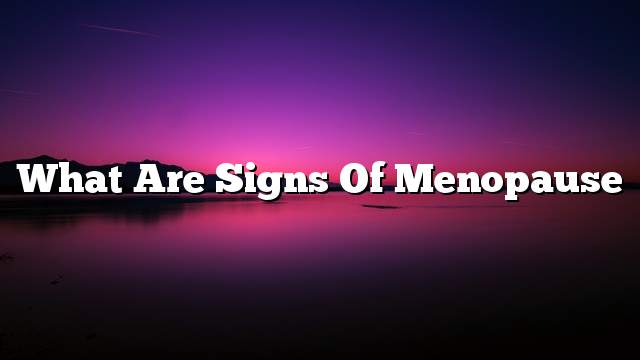Menopause
Is the stage reached by women in the late period of life, making them unable to have a final birth, and associated with a sudden or sudden interruption of the menstrual cycle for a continuous period of more than 6 months, a phenomenon that is normal for all women in the world when they reach the age of 45-55 , Menopause differs from one woman to another according to the activity of ovaries and the proportion of female hormones in the body.
At this stage, women move from fertility to the onset of aging. This is due to the cessation of production of oocytes in the ovaries resulting from the cessation of production of female hormones such as estrogen, accompanied by this difficult phase the emergence of a number of new symptoms on women vary in intensity from one case to another.
Causes of Menopause Access
- Age: In this case, menopause is a normal condition when the woman exceeds the age of forty.
- Deficiency of the ovaries: It occurs before the age of forty, so that the ovaries are unable to produce the hormone estrogen, although there is a normal number of oocytes in the ovaries.
- Cancerous tumors: The exposure of women to chemical treatments that treat some diseases such as breast cancer, uterine cancer and others stopped the production of ovaries early.
Signs of menopause
- Menopause usually begins with menstrual disorder, becoming mild and sporadic, occurring every two months or more, followed by a total interruption of the cycle for months lasting more than 6 months.
- The appearance of some symptoms, such as high body temperature, “heat attacks come out of the face and head,” in addition to excessive sweating effortlessly.
- Mood swings, depression, insomnia, sadness, anxiety, tension and extreme nervousness.
- Lack of secretion of the vagina, especially when intercourse, and the occurrence of severe pain due to lack of secretion of estrogen, which leads to the atrophy of the vagina and severe dryness.
- Inability to control urine, due to the atrophy of the bladder wall and the proliferation of urinary tract infections.
- Bone osteoarthritis: This starts with weakness in bone density and lack of vitamin D, in addition to sporadic breaks in the body especially in the pelvis, wrist and back vertebrae.
- Permanent infertility: inability to have children.
- Heart disease: At this stage, the risk of heart disease such as atherosclerosis and the occurrence of heart attacks due to lack of secretion of estrogen, which helps digest fat and maintains the integrity of the heart muscle, increases.
